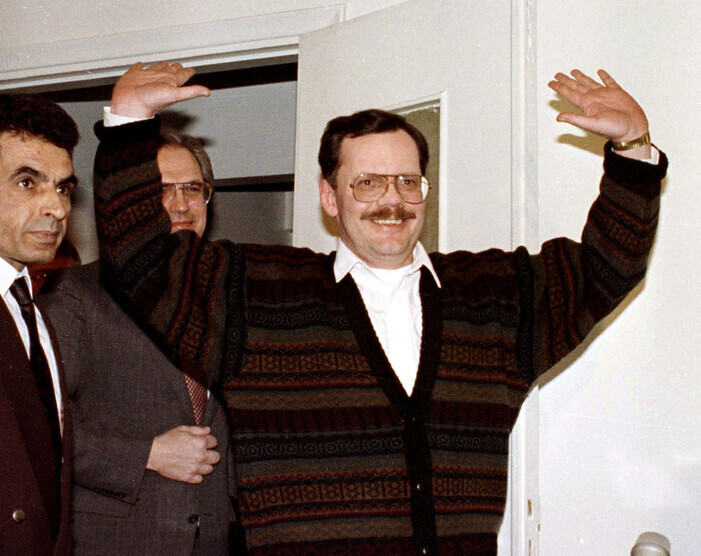hankyoreh
Links to other country sites 다른 나라 사이트 링크
Terry Anderson, AP reporter who informed world of massacre in Gwangju, dies at 76

Terry Anderson, a former Associated Press correspondent who relayed the truth of the South Korean military regime’s slaughter of civilians during the 1980 democratic uprising in Gwangju, died on Sunday. He was 76 years old.
His daughter revealed that he had undergone heart surgery and died from complications.
Anderson was on the ground in Gwangju from May 22 to May 27, 1980, alerting the world of facts that contradicted the official announcements from the military regime. Upon arriving in Gwangju, the martial law forces claimed that only a few civilian deaths had occurred. Anderson conferred with other foreign correspondents, and they traveled around the city together to confirm the number of dead. He wired his reports through AP’s Tokyo bureau, informing the world that while the martial law forces were claiming there were only three deaths, the actual number was close to 261. Anderson said that it was the first time he’d seen so many corpses.
In an interview with a Korean press outlet in 1996, Anderson said that his primary job was to find out how many people had died, and that he had spent an entire day traveling around the city, counting bodies. He went to high schools, gymnasiums, churches — every place they gathered that had been turned into makeshift morgues — and counted 179 bodies in a single day.
In an article he sent across the wire on May 23, 1980, Anderson wrote that the citizens of Gwangju started off protesting peacefully, but as paratroopers ruthlessly suppressed the demonstrations with rifles and bayonets, the protests turned into a fierce rebellion. Unlike domestic press outlets, which were just parroting the claims of the military regime, Anderson amplified the voices of the people of Gwangju.
Anderson pointed out in his reporting that Pak Choong-hoon, then the prime minister, talked about how “a few impure elements in society” had “attacked public property and set fire to it, stole weapons and fired guns at the army,” implying that communists were behind the protests.
Anderson, however, wrote that these claims “were never verified.”
The reporter later donated his original drafts about Gwangju to the city’s government, relaying them through domestic journalists.
While working as the AP’s chief correspondent in the Middle East, Anderson was detained by the militant group Hezbollah during the Lebanese civil war in 1985. He was not released until 1991. This is the longest that any American journalist has been held hostage. Anderson was subjected to torture, death threats, and extended periods of isolation.
Anderson retired from his position at the University of Florida in 2015, eventually settling on a small farm in rural northern Virginia.
“He never liked to be called a hero, but that's what everyone persisted in calling him,” Anderson’s daughter said.
“Terry was deeply committed to on-the-ground eyewitness reporting and demonstrated great bravery and resolve, both in his journalism and during his years held hostage. We are so appreciative of the sacrifices he and his family made as the result of his work,” said Julie Pace, the AP’s senior vice president and executive editor.
By Lee Bon-young, Washington correspondent
Please direct questions or comments to [english@hani.co.kr]

Editorial・opinion
![[Editorial] Penalties for airing allegations against Korea’s first lady endanger free press [Editorial] Penalties for airing allegations against Korea’s first lady endanger free press](https://flexible.img.hani.co.kr/flexible/normal/500/300/imgdb/original/2024/0502/1817146398095106.jpg) [Editorial] Penalties for airing allegations against Korea’s first lady endanger free press
[Editorial] Penalties for airing allegations against Korea’s first lady endanger free press![[Editorial] Yoon must halt procurement of SM-3 interceptor missiles [Editorial] Yoon must halt procurement of SM-3 interceptor missiles](https://flexible.img.hani.co.kr/flexible/normal/500/300/imgdb/child/2024/0501/17145495551605_1717145495195344.jpg) [Editorial] Yoon must halt procurement of SM-3 interceptor missiles
[Editorial] Yoon must halt procurement of SM-3 interceptor missiles- [Guest essay] Maybe Korea’s rapid population decline is an opportunity, not a crisis
- [Column] Can Yoon steer diplomacy with Russia, China back on track?
- [Column] Season 2 of special prosecutor probe may be coming to Korea soon
- [Column] Park Geun-hye déjà vu in Yoon Suk-yeol
- [Editorial] New weight of N. Korea’s nuclear threats makes dialogue all the more urgent
- [Guest essay] The real reason Korea’s new right wants to dub Rhee a founding father
- [Column] ‘Choson’: Is it time we start referring to N. Korea in its own terms?
- [Editorial] Japan’s rewriting of history with Korea has gone too far
Most viewed articles
- 160% of young Koreans see no need to have kids after marriage
- 2Presidential office warns of veto in response to opposition passing special counsel probe act
- 3Hybe-Ador dispute shines light on pervasive issues behind K-pop’s tidy facade
- 4S. Korea “monitoring developments” after report of secret Chinese police station in Seoul
- 5Months and months of overdue wages are pushing migrant workers in Korea into debt
- 6OECD upgrades Korea’s growth forecast from 2.2% to 2.6%
- 7[Editorial] Penalties for airing allegations against Korea’s first lady endanger free press
- 8Inside the law for a special counsel probe over a Korean Marine’s death
- 9Japan says it’s not pressuring Naver to sell Line, but Korean insiders say otherwise
- 10S. Korea discusses participation in defense development with AUKUS alliance